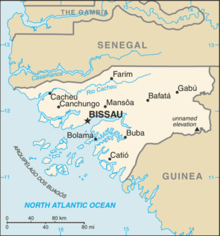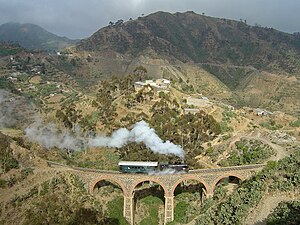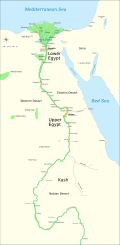Portal:Africa



Africa is the world's second-largest and second-most populous continent after Asia. At about 30.3 million km2 (11.7 million square miles) including adjacent islands, it covers 20% of Earth's land area and 6% of its total surface area. With nearly 1.4 billion people as of 2021, it accounts for about 18% of the world's human population. Africa's population is the youngest among all the continents; the median age in 2012 was 19.7, when the worldwide median age was 30.4. Based on 2024 projections, Africa's population will reach 3.8 billion people by 2099. Africa is the least wealthy inhabited continent per capita and second-least wealthy by total wealth, ahead of Oceania. Scholars have attributed this to different factors including geography, climate, corruption, colonialism, the Cold War, and neocolonialism. Despite this low concentration of wealth, recent economic expansion and a large and young population make Africa an important economic market in the broader global context. Africa has a large quantity of natural resources and food resources, including diamonds, sugar, salt, gold, iron, cobalt, uranium, copper, bauxite, silver, petroleum, natural gas, cocoa beans, and.
Africa straddles the equator and the prime meridian. It is the only continent to stretch from the northern temperate to the southern temperate zones. The majority of the continent and its countries are in the Northern Hemisphere, with a substantial portion and a number of countries in the Southern Hemisphere. Most of the continent lies in the tropics, except for a large part of Western Sahara, Algeria, Libya and Egypt, the northern tip of Mauritania, and the entire territories of Morocco, Ceuta, Melilla, and Tunisia, which in turn are located above the tropic of Cancer, in the northern temperate zone. In the other extreme of the continent, southern Namibia, southern Botswana, great parts of South Africa, the entire territories of Lesotho and Eswatini and the southern tips of Mozambique and Madagascar are located below the tropic of Capricorn, in the southern temperate zone.
Africa is highly biodiverse; it is the continent with the largest number of megafauna species, as it was least affected by the extinction of the Pleistocene megafauna. However, Africa also is heavily affected by a wide range of environmental issues, including desertification, deforestation, water scarcity, and pollution. These entrenched environmental concerns are expected to worsen as climate change impacts Africa. The UN Intergovernmental Panel on Climate Change has identified Africa as the continent most vulnerable to climate change.
The history of Africa is long, complex, and varied, and has often been under-appreciated by the global historical community. In African societies the oral word is revered, and they have generally recorded their history via oral tradition, which has led anthropologists to term them oral civilisations, contrasted with literate civilisations which pride the written word. During the colonial period, oral sources were deprecated by European historians, which gave them the impression Africa had no recorded history. African historiography became organized at the academic level in the mid-20th century, and saw a movement towards utilising oral sources in a multidisciplinary approach, culminating in the General History of Africa, edited by specialists from across the continent. (Full article...)
Selected article –
On 12 April 2012, a coup d'état in Guinea-Bissau was staged by elements of the armed forces about two weeks before the second round of a presidential election between Carlos Gomes Júnior and Kumba Ialá. The coup started in the evening with military personnel and equipment making its way onto the streets, followed by the state-owned media being taken off-air.
Both second-round candidates and the incumbent president were initially arrested by the junta. Members of the Military Council, which ran the country until an interim National Transitional Council was established on 15 April, said that one of the reasons for the coup was the incumbent civilian administration's call for Angolan help to reform the military. Following international condemnation and sanctions against leaders of the junta, an agreement was signed that led to the third place candidate in the election, Manuel Serifo Nhamadjo, being selected as interim president. The presidential election was aborted and postponed for at least two years into the future. An interim government was tasked with administering Guinea-Bissau in the meantime. (Full article...)
Featured pictures –
Did you know (auto-generated) -

- ... that Mary Jane Patterson, whose mother was an African-American slave, gained a BA degree in 1862 having taken a "gentleman's course"?
- ... that The Red Moon was the first Broadway show to depict alliances between African Americans and Native Americans?
- ... that opera singer Charles Holland spent much of his career in Europe as opportunities in classical music for African Americans were limited?
- ... that one way to tell the African dusky flycatcher apart from the ashy flycatcher is that the former is "cuter"?
- ... that the Shady Rest Golf and Country Club was the home of John Shippen, the first African American to compete in the U.S. Open?
- ... that police in Indianola, Mississippi, shot an unarmed 11-year-old African-American boy after responding to his 9-1-1 call for help at his home?
Categories
Selected biography –
Barack Hussein Obama Sr. (/ˈbærək huːˈseɪn oʊˈbɑːmə/; born Baraka Obama, 18 June 1934 – 24 November 1982) was a Kenyan senior governmental economist and the father of Barack Obama, the 44th president of the United States. He is a central figure of his son's memoir, Dreams from My Father (1995). Obama married in 1954 and had two children with his first wife, Kezia. He was selected for a special program to attend college in the United States and studied at the University of Hawaii where he met Stanley Ann Dunham, whom he married in 1961 following the conception of his son, Barack. Obama and Dunham divorced three years later. Obama then went to Harvard University for graduate school, where he earned an M.A. in economics, and returned to Kenya in 1964. He saw his son Barack once more, when his son was about 10.
In late 1964, Obama Sr. married Ruth Beatrice Baker, a Jewish-American woman he had met in Massachusetts. They had two sons together before separating in 1971 and divorcing in 1973. Obama first worked for an oil company, before beginning work as an economist with the Kenyan Ministry of Transport. He was promoted to senior economic analyst in the Ministry of Finance. He was among a cadre of young Kenyan men who had been educated in the West in a program supported by Tom Mboya. Obama Sr. had conflicts with Kenyan president Jomo Kenyatta, which adversely affected his career. He was fired and blacklisted in Kenya, finding it nearly impossible to get a job. Obama Sr. was involved in three serious car accidents during his final years; he died as a result of the last one in 1982. (Full article...)
Selected country –
 |
 |
||
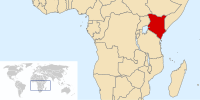
| |||
Kenya, officially the Republic of Kenya, is a country in Eastern Africa. It is bordered by Ethiopia to the north, Somalia to the northeast, Tanzania to the south, Uganda to the west, and Sudan to the northwest, with the Indian Ocean to the southeast. At 224,961 mi² (582,646 km²), Kenya is the world's forty-seventh largest country. Mount Kenya, which reaches 5,199 meters (17,057 ft), is the highest point in Kenya and the second highest in Africa.
Nairobi, the capital, is the primary communication and financial hub of East Africa. It enjoys the region's best transportation linkages, communications infrastructure, and trained personnel, although these advantages are less prominent than in past years. A wide range of foreign firms maintain regional branches or representative offices in the city. In March 1996, the Presidents of Kenya, Tanzania, and Uganda re-established the East African Community (EAC). The EAC's objectives include harmonizing tariffs and customs regimes, free movement of people, and improving regional infrastructures. In March 2004, the three East African countries signed a Customs Union Agreement. (Read more...)
Selected city –
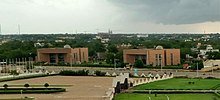
N'Djamena (English: /əndʒɑːˈmeɪnə/ ən-jah-MAY-nə) is the capital and largest city of Chad. It is also a special statute region, divided into 10 districts or arrondissements.
The city serves as the centre of economic activity in Chad. Meat, fish and cotton processing are the chief industries, and it is a regional market for livestock, salt, dates, and grains. (Full article...)
In the news
- 12 February 2024 –
- Two boats collide on the Congo River near Kinshasa, Democratic Republic of the Congo; with the death toll remains unclear. (AP)
- 11 February 2024 – 2023 Africa Cup of Nations
- In association football, hosts Ivory Coast win their third Africa Cup of Nations by defeating Nigeria 2–1 in the final. Sébastien Haller scores the winning goal in the 81st minute. (The Guardian)
- 10 February 2024 – Somali civil war
- Four Emirati soldiers and a Bahraini military officer are killed, while ten other people are injured, when a soldier opens fire at a military base in Mogadishu, Somalia, before being killed in the ensuing shootout. Al-Shabaab claims responsibility. (AP)
- 10 February 2024 –
- A Eurocopter EC130 helicopter crashes near Nipton, California, United States, killing all the six people on board, including Nigerian banker Herbert Wigwe. (CBS News)
- 10 February 2024 – 2023–2024 Senegalese protests
- Violent protests occur in Senegal following an announcement by President Macky Sall that presidential elections have been delayed from February 25 to December 15. (Sky News)
- 9 February 2024 –
- At least 18 people are killed during a collision between a bus and a truck on a road in Kinshasa, Democratic Republic of the Congo. (AP)
Updated: 16:33, 14 February 2024
General images -
Africa topics
More did you know –
- ...that Rukwanzi Island, an island in Lake Albert, one of the African Great Lakes, is the subject of a territorial dispute between the Democratic Republic of the Congo and Uganda?
- ...that Oumarou Sidikou, vice-governor of the Central Bank of West African States from 1988 to 1993, was a minister in the government of Nigerien Prime Minister Hama Amadou, which was ousted by a military coup in 1996?
- ...that Jason Dunford, an All-Africa Games gold medalist and runner-up for the 2006 Kenyan Sportsman of the Year award, has a younger brother who was selected "most promising sportsman" at the same awards?
- ...that Sam Mbakwe, governor of Imo State from 1979 to 1983, served in the army of the Republic of Biafra, an Igbo secessionist state in southeastern Nigeria, during the Nigerian Civil War?
Related portals
Major Religions in Africa
North Africa
West Africa
Central Africa
East Africa
Southern Africa
Associated Wikimedia
The following Wikimedia Foundation sister projects provide more on this subject:
-
Commons
Free media repository -
Wikibooks
Free textbooks and manuals -
Wikidata
Free knowledge base -
Wikinews
Free-content news -
Wikiquote
Collection of quotations -
Wikisource
Free-content library -
Wikispecies
Directory of species -
Wikiversity
Free learning tools -
Wikivoyage
Free travel guide -
Wiktionary
Dictionary and thesaurus

